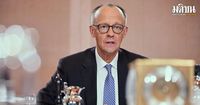Friedrich Merz has officially taken the reins as Germany's new Chancellor, succeeding Olaf Scholz in a historic transition marked by a rare two-round voting process. On May 6, 2025, Merz, the leader of the Christian Democratic Union (CDU), garnered 325 votes in the second round, surpassing the 316 votes needed to secure the position. This marked the first time in 76 years that a German Chancellor was elected after failing to achieve a majority in the first round, where he only managed to secure 310 votes.
At 69 years old, Merz is no stranger to the political landscape, having previously served as a member of the European Parliament. His election comes at a pivotal moment for Germany, as the country seeks to strengthen its role as a leader in Europe amidst ongoing geopolitical tensions, particularly concerning the war in Ukraine and relations with Russia.
Following his election, Merz wasted no time in establishing his diplomatic agenda. On May 7, he embarked on his first official trip to France and Poland, aiming to reinforce alliances with key European partners. In Paris, he met with President Emmanuel Macron, emphasizing the importance of collaboration between Germany and France. Later that day, he continued to Poland, where he engaged with Prime Minister Donald Tusk, discussing pressing issues such as immigration policies and support for Ukraine.
Merz's administration is characterized by a coalition with the Social Democratic Party (SPD), which has raised concerns about unity within the government. His initial failure to secure a majority in the first round of voting highlighted the challenges he faces in garnering support from coalition partners. Nevertheless, Merz expressed confidence in the coalition's ability to work together, stating, "I want to focus on my work rather than dwell on why coalition members did not support me in the first vote." He emphasized his commitment to ensuring freedom in Germany and revitalizing the country's economic competitiveness.
Experts believe that Merz's leadership could signal a shift towards a more assertive German foreign policy. He has indicated plans to centralize foreign and European policy decisions within the Chancellery and establish a National Security Council to enhance the effectiveness of Germany's international engagements. His vision includes fostering stronger military cooperation within Europe, aligning with France's push for a unified defense system.
As Merz steps into his role, Europe is at a crossroads, grappling with various challenges, including the ongoing conflict in Ukraine, which has prompted discussions about security guarantees and potential ceasefire agreements. Additionally, the continent faces economic pressures stemming from trade disputes and tariffs enacted during the Trump administration, which have significant implications for Germany's economy.
During his visit to Poland, Merz is expected to address the urgent need for coordinated responses to these challenges, particularly in light of Poland's active support for Ukraine. Polish officials have expressed hope that under Merz's leadership, Germany will re-emerge as a strong partner in European affairs.
The newly appointed Chancellor's approach to immigration has also garnered attention. The coalition government has agreed to tighten immigration policies, including rejecting asylum seekers at the borders, while emphasizing the need for collaborative efforts with neighboring countries. This stance reflects a broader trend in Europe, where many nations are reassessing their immigration strategies in light of recent crises.
Merz's election and subsequent actions signal a renewed commitment to Germany's role as a leading force in Europe. His ability to navigate the complexities of coalition politics while addressing pressing international issues will be closely watched by allies and critics alike.
In conclusion, Friedrich Merz's ascension to the Chancellorship marks a significant moment in German politics, reflecting both the challenges and opportunities facing the country as it seeks to assert its influence on the European stage. As he embarks on this new chapter, the expectations for his leadership are high, with many hoping he can restore Germany's reputation as a stabilizing force in a turbulent world.





